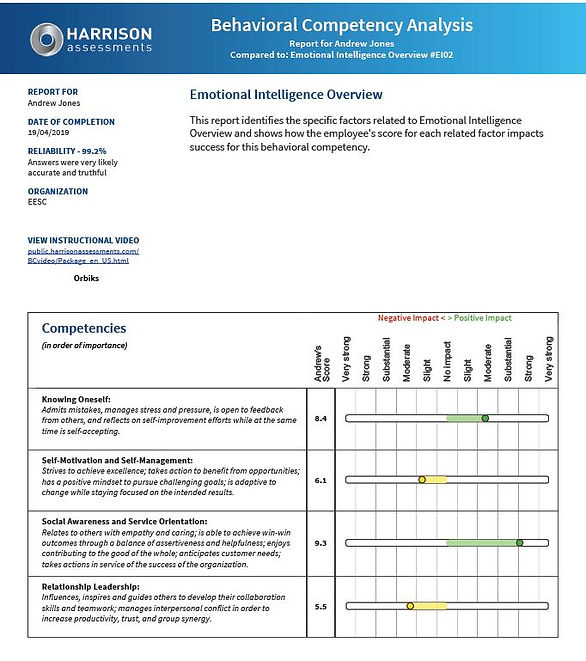Role fitness is a measure of how well a person is matched for the demands of a particular job. If you are a good fit for a job, you will tend to perform well and be happy. Role fitness is a combination of your Competence and Motivation in the diagram below. Lifestyle fitness and Mental fitness are explored separately.
Role fitness is assessed using the Harrison Smart Questionnaire, which assesses Behavioural preferences and interests.
Performance
fn
Competence
IQ / EQ
Knowledge
Skills
x
Commitment
Motivation
Lifestyle Fitness
Mental Fitness

Behavioural Preferences & Interests
After completing the Harrison Smart Questionnaire a variety of different reports can be provided covering, for example, Leadership competences, Emotional Intelligence and Motivation. Leaders must manage many important paradoxes. Harrison is unique in offering a report that provides feedback on how well leaders and team members are managing key work paradoxes.
These reports are explored in more detail below:
Behavioral competency report
The Harrison Behavioral Success Analysis provides a detailed breakdown of the traits under three categories:
Success traits:
Which can have a positive or
negative impact on success of a role
Traits
That can hinder if low
Negative traits
Which if present will have a negative impact on success
This report enables leaders / team members to leverage those strengths that have helped them be successful, become aware of areas of potential weakness that might need to be developed to enable a leader / team member to achieve their full potential and eliminate any negative traits that could derail their success.


Emotional Intelligence report
In his book, Emotional Intelligence: Why it can matter more than IQ, David Goleman reports that emotional competences make up to 80% of the distinguishing competencies of outstanding leaders and that emotional intelligence comprises learned abilities that can be deliberately developed with practice. Again, the report enables leaders to leverage strengths and identify any areas of weakness.
Engagement and Employment Expectations
This report helps a leader to better understand their own engagement factors (as well as those of their team members) and pinpoint any problem areas.
The report includes 8 areas of employment expectations (the dark blue bars):
Development
Remuneration
Authority
Social
Appreciation
Communication
Personal
Work life balance
The light blue bars highlight the traits that the person needs to support their expectations.


Paradox Graph
This report is designed to provide deep insights into behavioral patterns and potential responses under stress. It focuses on 12 paradoxes that are key in the workplace. A paradox is a seemingly contradictory statement, which may nonetheless be true. Within each paradox there are two complimentary (paradoxical) traits. Essential leadership traits are highlighted in green, desirable traits are highlighted in blue. Each of the 12 pairs of paradoxical traits are portrayed on the XY graph in order to show the relationship between the traits. For example, in the Communication graph, the traits are Frank (the tendency to be direct and to the point) and Diplomatic (the tendency to state things in a tactful manner). Someone with a good balance of Frankness and Diplomacy is more likely to be able to build cooperative relationships.

